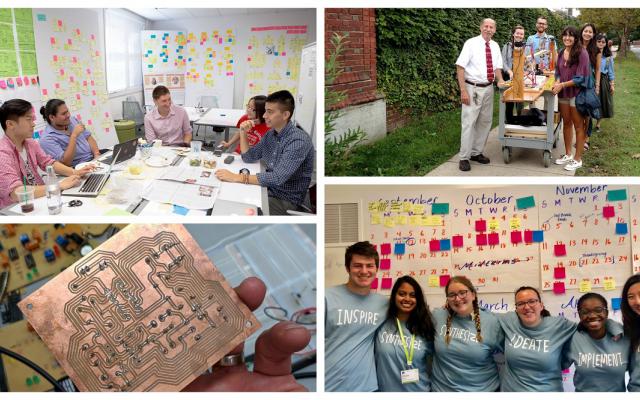
The Keller Center has revamped the course sequence EGR 250, 251, 350, 351, 450, 451, and so the course previously known as “EPICS: Engineering Projects in Community Service” is now titled “Community Project Studios.”
After extensive and collaborative discussions between the course faculty and the Keller Center administration, the consensus was that the title "EPICS" no longer reflects the current course offerings. First, EPICS was originally named to match a national (and eventually global) curricular program initiated by Purdue University in 2005 and introduced at Princeton University in fall 2006 by co-founder Professor Ed Coyle *82.
Since that time the approaches of Princeton's program and the global EPICS program have diverged, and the breadth of the work in Princeton's course projects has grown larger than what “Engineering” suggests. For examples, the course includes Princeton students helping teach computer science classes in nearby secondary schools, and they are primarily learning pedagogical theories and techniques, as well as helping design computer science curricula. This studio is known as "CS Education for All."
Additionally, the revamped sequence will include a section in which students use design thinking to help nonprofit and government partners create new services to address unmet societal needs. The types of projects and the “toolbox” of techniques used to meet them go well beyond Engineering, and therefore warrant a broader name.
Across all sections of the sequence, teams are interdisciplinary and comprised of students from varying majors. The studio format reflects the degree of creativity and interaction that is the basis of impactful problem-solving as taught in these courses. Since the courses have changed over time with new projects added, in order to address the program’s curricular goals as well as the needs and interests of our students, a new title was required.
The latter stages of the social impact program Tiger Challenge will also join the revamped Community Project Studios. In Tiger Challenge, small teams of students and advisers work with nonprofit or government partners on multi-year societal impact projects. The teams use design thinking as the primary methodology. In Community Project Studios, Tiger Challenge teams will prototype their designs and then run a pilot along with an impact evaluation, studying intended and unintended impacts.
In Community Project Studios, students earn academic credit for participation in multidisciplinary teams that work on projects over one or more years. The course mission is to provide a hands-on, experiential environment, in which students (often alongside community partners) bring real-world projects through to fruition. Although the methodology and projects vary for each studio, all teams in the program are supported through skill-development workshops, close-knit advising, and cultures of peer-to-peer collaboration. Students may participate for up to six semesters.
Students of all majors (AB and BSE) and class years are encouraged to seek enrollment.
Current Studios
Studio 1 'Making to Learn and Serve' (formerly 'Time Team')
Studio 2 'Technology for Developing Societies' (formerly 'Design for Developing World')
Studio 3 'CS Education for All' (formerly 'Computing Mentors')
Studio 4 'Tiger Challenge' (new)
Course selection for fall 2019 opens April 22 for juniors, April 24 for sophomores, and April 29 for first year students.